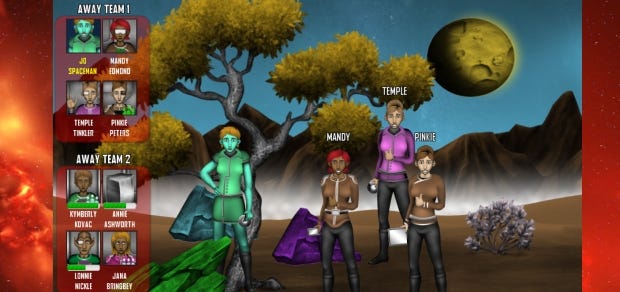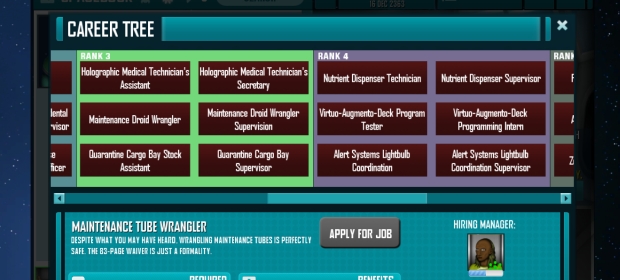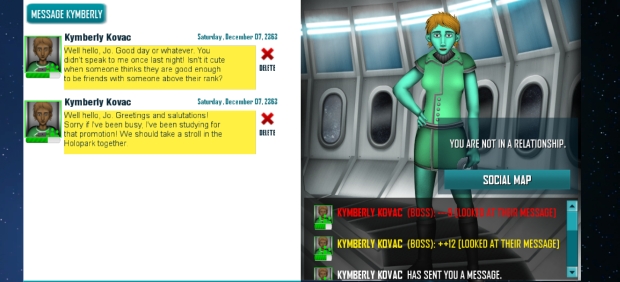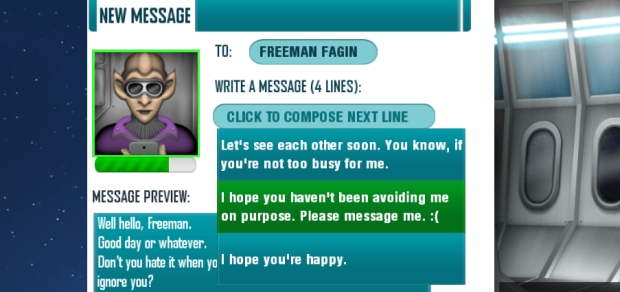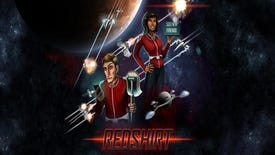Wot I Think: Redshirt
Expendable
Redshirt's Spacebook sounds like the perfect idea: it's a life sim which uses a social network as a metaphor through which to convey each character's personal data and stats. The jokes write themselves. Add a Star Trek-like space station as the setting and you can almost see each element of the game's design spooling out in front of you.
It's a shame that the concept is the only thing I like.
My first minutes with Redshirt were spent checking my relationship via the Spacebook friends list and looking through a feed of status updates that filled me in on life aboard the station. The metaphor works.
You're then presented with a limited number of actions you can perform each day. When someone I didn't know wrote a compliment on my wall, I had to decide: do I use an action point to Like it and foster that relationship, or do I create a Spacebook event for dinner with my boss and help myself on the road towards career success?
Within an hour I knew that neither option mattered as much as I wanted it to. I love life simulations because they allow you to craft broad, dramatic sweeps of a character's life in quick bursts. In the excellent albeit creepy Princess Maker 2, that means shaping your daughter into a fearless adventurer, a powerful fighter, or a good cleaner and cook.
Redshirt never feels so responsive. Partly that's deliberate. In interviews and previews, the game has been described by its developer as a "disempowerment fantasy". The highest role you can hold within the ship isn't captain but captain's assistant. The jobs you'll grind your way through are marked by menial labour, such as "Hazardous Alien Waste Management Supervisor" or "Alert Systems Lightbulb Coordination Supervisor".
It's meant as a satire on the shallow relationships and sense of progress provided by social networks, but its commentary doesn't reveal itself to you through play. You've already gleaned everything you're going to get from it by reading a description of it.
Disempowerment would be fine as a theme and as a source of humour, but when it also limits the impact of my actions, the lack of meaningful consequences left me questioning why I was there. The game's plot-driven motivation - that something terrible is going to happen in 159 days and that the only way to survive is to climb social or career ladders - does little to redeem the emptiness of your actions.
The act of progressing through those ladders happens via a grind of Likes and space station-themed events, such as "Play a Game of Zero-G Tennis" or "Design a Virtuo-Augmento-Deck Program". Your stats tick up bit by bit, you change social circles as you neglect old co-workers or lovers, but your basic activities remain the same. Nothing particularly interesting happens in response to your decisions. You're never forced to change your strategy, or even really have one.
When my first romance went south, it was because I had already been neglecting my partner for a while and when she saw me flirt with someone else, she dumped me. My partner had also been flirting with other people, but there was no meaningful way for me confront her about that. Later, after repeatedly sending me angry messages, she unfriended me completely. It didn't matter, because the relationship had never existed in any meaningful sense in the first place.
Other systems are piled on top, each one of equally questionable value. There's a shop, in which you spend KarmaCreds on items which give you temporary boosts to certain stats or your character's mood. You also have to eat occasionally to keep your health up. Neither seemed to matter.
Of course, that's the joke - social networks are echo-chambers, Likes are currency, and online relationships can be fickle. I get it. But the game is trapped between satirising its shallow subject matter and needing to meet you halfway in the creation of its fantasy.
In practice a lifelike Facebook requires a far more adept AI than any game can provide. Redshirt's cast of characters constantly post updates about their day, but you'll start to see repeated messages within twenty minutes of playing.
That wouldn't be so bad - I wasn't expecting lifelike perfection - but many of the messages are awful puns. "You're the hottest supergiant star in my galaxy." "Hey baby, how about you and me? And some Earl Grey? Hot". These are jokes that made me cringe or at best gently smile on the first read. By the time I had seen some of them half a dozen times in a single hour, I wanted to unfriend everyone on Spacebook, delete my account, and join Spacegoogle+ so I could be alone.
Worse still is that characters contradict themselves, sending you a hurt or angry private message before following it up on the same day with a friendly message about how much they'd like to see you. I had one boyfriend who sent me daily messages about wanting to see more of me while failing to turn up half the events I invited him to. Maybe that's part of the joke too, but I don't think so.
Redshirt is a fine idea, but it delivers disempowerment in the wrong ways by mixing its commentary with its mechanics. The lack of power means the most dramatic events in the game happen outside of your control. That includes randomly triggered away missions, in which you're only ever able to make a single decision over which of your fellow crew members will die. In most games of this sort, away missions would be an event you'd trigger, a way of testing your mettle and being forced to live with the consequences. Redshirt makes it just another item on a todo list.
That lack of meaningful choice or consequence, coupled with a fantasy which is constantly being undercut by its limited execution, makes Redshirt a disappointment. I liked the idea. I wanted to like the game. Instead I'll treat it as I do most of my annoying friends on Facebook, and press Ignore.
